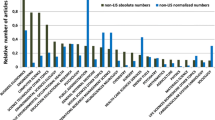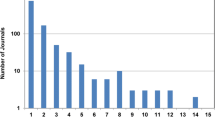Summary
Among the many statistics on science, called scientometrics, bibliometrics holds a privileged place. Bibliometrics is one of the few subfields concerned with measuring the output side of science. According to most “histories”, bibliometrics owes its systematic development mainly to D.J.D. Price and Eugene Garfield, as founders. The few works conducted before the 1950s are usually relegated to prehistory. This paper documents how the systematic counting of publications originated with psychologists. In the early 1900s, psychologists began collecting statistics on their discipline. Publications came to be counted in addresses, reviews and histories of psychology for several decades. The aim was to contribute to the advancement of psychology. Far from being a negligible output of a prehistoric type, both the volume and the systematicness of these efforts are witnesses to what should be considered as pioneering work, and their authors considered as forerunners to bibliometrics.
Similar content being viewed by others
Author information
Authors and Affiliations
Rights and permissions
About this article
Cite this article
Godin, B. On the origins of bibliometrics. Scientometrics 68, 109–133 (2006). https://doi.org/10.1007/s11192-006-0086-0
Issue Date:
DOI: https://doi.org/10.1007/s11192-006-0086-0




